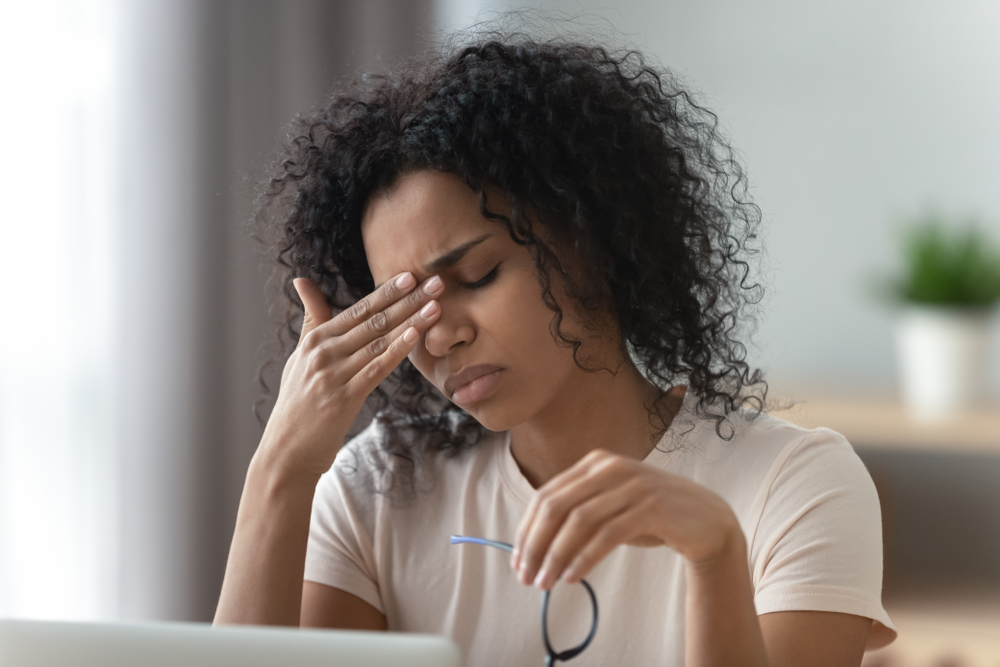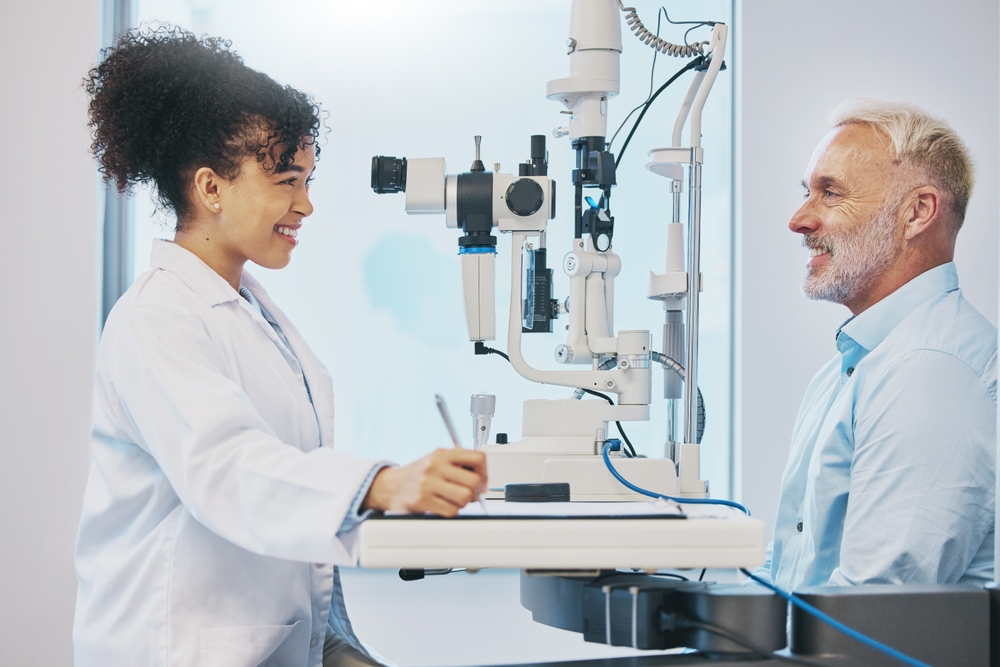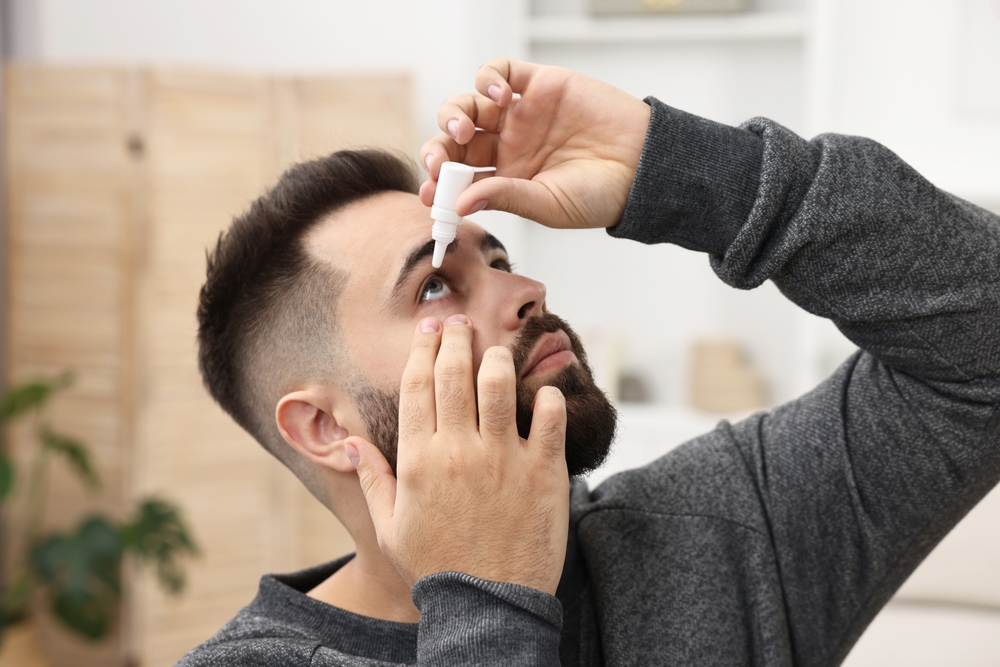If you’ve been experiencing persistent eye irritation, dryness, or an uncomfortable feeling as if something is in your eye, you’re probably wondering what’s causing these symptoms. While many factors can contribute to dry eye syndrome, one often-overlooked culprit may be sitting right in your medicine cabinet.
Keep reading to learn more about how certain medications can cause dry eye symptoms and what you can do to find relief.
How Can Medications Cause Dry Eye?

Your eyes rely on a delicate balance of tear production and drainage to maintain comfort and clear vision. When certain medications interfere with this process, dry eye symptoms can develop or worsen significantly.
The tear film that protects your eyes consists of three essential layers: an oil layer that prevents evaporation, a water layer that nourishes the cornea, and a mucin layer that helps tears spread evenly across the eye’s surface. Many common medications can disrupt one or more of these layers, leading to the burning, scratching, and irritation associated with dry eyes.
Common Medications That Can Cause Dry Eye Symptoms
Medications that have been linked to dry eye include:
Antihistamines and Allergy Medications
Allergy medications, including both over-the-counter and prescription antihistamines like Benadryl, Claritin, and Zyrtec, are frequent contributors to dry eye symptoms. These medications work by blocking histamine receptors throughout your body, but they also reduce tear production as an unintended side effect.
Blood Pressure Medications
Several classes of blood pressure medications can impact tear production. Beta blockers, diuretics, and ACE inhibitors may all contribute to dry eye symptoms.
These medications can affect the nerves that stimulate tear production or alter the composition of your tears, making them less effective at lubricating your eyes.
Sedatives and Sleep Aids
Medications that affect your central nervous system, including sleep aids, anxiety medications, and sedatives, can significantly reduce tear production. These drugs can slow down the natural reflexes that trigger tear production, leaving your eyes more vulnerable to dryness, particularly during sleep when tear production naturally decreases.
Antidepressants
Many antidepressants, particularly tricyclic antidepressants and selective serotonin reuptake inhibitors (SSRIs), can cause dry eye symptoms. These medications can affect the autonomic nervous system, which controls involuntary functions, including tear production.
Decongestants and Cold Remedies
Over-the-counter decongestants and multi-symptom cold remedies often contain ingredients that can dry out mucous membranes throughout your body, including those in the eyes. These medications work by constricting blood vessels, which can reduce the blood flow needed for healthy tear production.
Medicated Eye Drops
Ironically, some eye drops can actually worsen dry eye symptoms over time. Drops containing preservatives, redness relievers like Visine, or certain glaucoma medications can irritate the eye surface and disrupt natural tear production when used regularly.
How Eye Doctors Identify Medication-Related Dry Eye

Batra Vision Medical Group’s comprehensive approach to dry eye diagnosis includes a thorough review of your current medications, including prescription drugs, over-the-counter remedies, and supplements. Their experienced team understands the complex relationship between various medications and dry eye symptoms, allowing them to identify potential contributors that other healthcare providers might overlook.
Batra Vision Medical Group also uses advanced diagnostic tools, including the TearLab Osmolarity System, to measure the quality and quantity of your tears. This precise testing helps your eye doctor determine whether your medications are contributing to your dry eye symptoms and develop an appropriate treatment plan.
Treatment Options for Medication-Induced Dry Eye
Depending on the severity and causes of your dry eye symptoms, your eye doctor may recommend one or more of these solutions:
Medication Management
When your eye doctor identifies medications as contributors to your dry eye symptoms, they work closely with your other healthcare providers to explore alternatives. In some cases, switching to a different medication within the same class can provide the therapeutic benefits you need while reducing dry eye symptoms.
However, you should never discontinue essential medications without consulting your prescribing physician.
Lifestyle Modifications
Simple changes in your daily routine can help counteract the drying effects of medications. Remember to blink frequently when reading or using screens, use a humidifier to maintain proper indoor humidity levels, and wear wraparound sunglasses outdoors to protect against wind and sun exposure.

Artificial Tears
For patients who must continue taking medications that contribute to dry eyes, high-quality artificial tears can provide significant relief. Batra Vision Medical Group recommends preservative-free artificial tear solutions that can be used as frequently as needed to supplement your natural tear production.
Advanced Treatment Options
When over-the-counter solutions aren’t sufficient, your eye doctor may offer several advanced treatment options:
Punctal Plugs: These tiny devices are placed in your tear ducts to prevent tears from draining too quickly, helping to keep your eyes more comfortable throughout the day.
LipiFlow Treatment: LipiFlow addresses evaporative dry eye by unblocking the meibomian glands that produce the oil layer of your tears. Clinical studies show that 79% of patients report improvement in dry eye symptoms within four weeks of treatment.
Prokera Amniotic Membrane: For patients with moderate to severe dry eye and corneal damage, this treatment promotes healing and can provide months of relief.
Managing dry eye symptoms while maintaining your overall health requires a comprehensive and personalized approach. Batra Vision Medical Group’s experienced team combines advanced diagnostic technology with proven treatment methods to help you achieve comfortable, clear vision regardless of the medications you need to take.
Don’t let medication-related dry eye symptoms compromise your quality of life. Schedule an appointment at Batra Vision Medical Group in San Leandro, CA, today!

 Follow Us!
Follow Us!